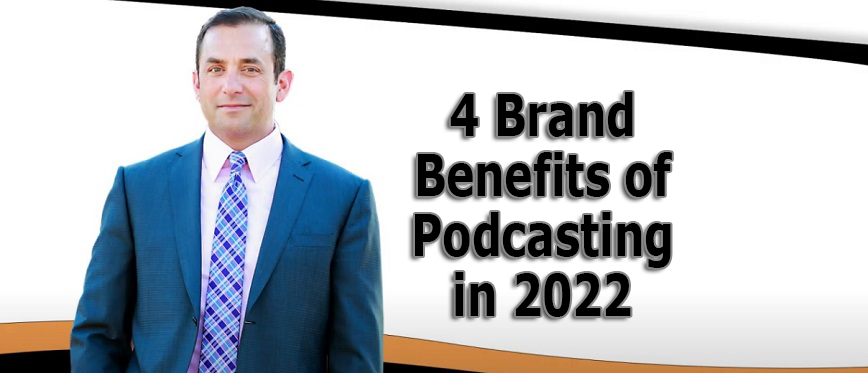Podcasts are accomplishing more for brands than anybody could have predicted. Even in 2022, the podcasting medium is still relatively new in the realm of brand marketing, and it is an underutilized creative channel that may be leveraged to connect with your audience. Continue reading to see why you should consider establishing a corporate podcast for your company.
Edison Podcasting Study
According to Edison research, the podcasting sector is on the rise. With a roughly 20% growth rate and the overall podcasting audience predicted to quadruple between 2020 and 2023, one will see more of it in the future. With the rise of podcasting comes a plethora of big potential for businesses to become involved in this fascinating content medium.
Gartner Podcasting Study
The experts at Gartner Research have compiled a list of tools that merchants should be using. One of them is… you guessed it… podcasting!
This may be old territory for us audiophiles, but it is exciting to see that a research firm with the authority of Gartner has come up with a new formula for retail success that incorporates our favorite podcasting medium.
Gartner’s major message was that we must first accept and trust the podcasting medium in order for it to succeed in our enterprises. Companies such as Apple and Spotify have made podcasting popular via their streaming services, and new recording tools and techniques for disseminating podcasts make it simpler to record and edit podcasts every day.
Podcasting’s Advantages for Global Brands
Brands often have a deep awareness of the psychographic composition of their target consumers. You can now create podcasts that are aligned with that information to assist you in connecting with additional people that have similar psychographic makeups, enabling you to connect with more prospective clients.
Here are some well-known firms that were among the first to capitalize on the potential of podcasting:
- REWORK was created by Basecamp, a project management software firm.
- Hello Monday is available on LinkedIn.
- Johnson & Johnson is the host of Innovation.
- Shopify has two podcasts! Vanguard and Masters.
4 Podcasting Advantages That Brands Should Be Aware Of
1. Brand podcasts only reach out to audiences that have shown an interest in a certain topic.
Those who were early adopters of branded podcasting discovered a means to convey issues of interest to an audience that is both ready to listen and associated with the brand. They may be reaching smaller audiences than marketers are used to targeting. Branded or corporate podcasts often attract a smaller, but higher-quality audience that is highly interested and eager to binge listen to numerous episodes of the program.
Unlike radio, which tends to cover a wide range of subjects in a single episode with no overall theme, podcasts usually have a single overarching topic. Sephora’s podcast, for example, focuses on cosmetics, while Buffer talks social media marketing.
Listeners of these podcasts go out of their way to choose this material, indicating an interest in these themes. This indicates that your audience, large or little, is extremely relevant and qualified to connect with your brand.
2. Podcasts are an excellent supplement to a brand’s blog and video strategies.
If you already have a blog and a video content strategy in place, podcasting might be a logical next step for your company. Using an audience that already trusts and connects with you is a smart strategy to start creating a listenership for your podcast. You may generate comparable material on the same topic and release it concurrently to help market your podcast to your viewers.
According to John Wall, co-host of the Marketing Over Coffee podcast:
“If you do it right, you’ll never have more devoted fans than podcast listeners.”
3. Podcasts Can Be Streamed On Demand
We’ve evolved into a “on-demand” culture. The concept of just having one chance to see a live event is long gone. We’ve gotten used to consuming stuff whenever we want, rather than when it’s provided.
As a result, podcasts are thriving. They’re accessible at the precise time a listener chooses to tune in, whether that’s the day it airs or six months afterwards.
Podcasts have multiple episodes that may be played back-to-back, allowing for binge listening that listeners can get addicted to. When you do it right, as Wall shown above, those listeners will actively seek out your podcast and reward you for gaining their full attention with downloads, star ratings, binge episodes, and overall popularity increase.
4. Podcasts allow you to shift gears and earn your audience’s audio attention rather than their visual attention.
Your audience is distracted with varied screen time priorities and other chores that occupy their visual attention for the remainder of the day.
Making a push for your audience’s visual attention by inundating them with additional blog articles and videos might be a losing struggle, particularly given the on-demand consuming style that we have grown to favor. Our social networks, favorite online newspapers, and email newsletters, at the very least, enable us to save stuff for our future selves so that we may revisit and appreciate it later. So you’re not only fighting for attention right now, but your audience is also scheduled through tonight!
Instead of fighting for more of their screen time, request their voice attention. Consider this: What everyday tasks do you engage in where you may listen and speak at the same time? Showering, washing the dishes, folding laundry, driving to work, going to the gym, going for a stroll, and so forth. The list goes on and on. This is an excellent moment to consume stuff. Podcasts enable you to become a part of your audience’s day and capture their auditory attention with your brand’s podcast.
A Showcase-worthy Brand Podcast
Blue Apron’s Why We Eat What We Eat is an excellent illustration of why firms develop corporate podcasts and how they fit into their overall marketing plan.
If you listen to podcasts, you’ve probably come across a Blue Apron commercial or two.
After experimenting in the medium for years via podcast advertising, the company took the jump and created its own program in 2017. Why We Eat What We Eat delves into “the hidden factors that govern and affect people’s dietary selections.”
Blue Apron’s show-launching blog article explains how podcasting fits into their entire content marketing strategy:
“Blue Apron focuses on delivering quality content for consumers throughout its product experience in order to increase the company’s value for lifetime learning in the kitchen… Why We Eat What We Eat is a logical extension of Blue Apron’s current storytelling skills, as well as a new platform for delving further into subjects and trends found via corporate data and input from home chefs nationwide.”
This description shows how Blue Apron used what it knows about its consumers’ psychographics and objectives to create more amazing content that benefits the audience, this time using audio.
Podcasting may help you reinforce your brand strategy for 2022
Is your brand telling a story? Yes, of course it does!
Do your goods and services attempt to improve or simplify the lives of your customers? If you don’t do this, you wouldn’t be in business.
Taking everything into account, there is certainly a place for you in the podcasting medium as part of your entire content marketing plan.
Consider podcasting and its possibilities the next time you’re at a loss for new strategies to further your brand’s growth. If you’re ready to learn more about the ins and outs of podcasting, check out our post about how to start a podcast.
Enjoy your podcasting!



